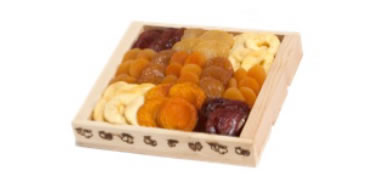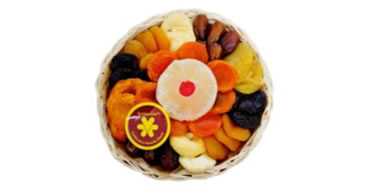FAQ
Have a question regarding nutritional information, baking, consuming with Goldenvale® snacks, allergens in Goldenvale® products, etc.? Please contact us if you a question not answered below.
NUTRITION
-
What is a serving size?
The serving size, or portion, of a food product or meal is regulated by the FDA and the USDA to ensure that nutritional labels are consistent and easy to read from product to product. A serving size is defined as the amount of a food product or meal that has been deemed as usual or recommended for an average adult, unless indicated otherwise for children. The weight, volume or unit of measurement for a serving size is indicated on the packaging. one serving of California Raisins is about forty (40 grams) or about 1.4 ounces or ¼ cup.
-
How many calories are in a serving of Goldenvale Raisins?
A serving (1.4 ounces or 40 grams) of Goldenvale Raisins contains 130 calories.
-
Why raisins have a higher iron content than fresh grapes?
The recognized serving of raisins is about 1/4 cup or 43 grams and that contains nearly 1 milligram (0.81mg) of iron while a 1-cup serving of fresh grapes at 126 grams has less than 0.5 milligram (0.45mg). However, you have to recognize that there are way more raisins in that 1/4 cup weighing about 40 grams than there are grapes in that 1 cup weighing 126 grams. Then, serving for serving, neither one of these is a really good source of iron, but you will get more iron from a serving of raisins than you will from a serving of grapes.
-
What types of vitamins are found in Goldenvale Raisins?
California Raisins contain less than 2% of the Recommended Daily Intake (RDI) of vitamins A and C per serving as noted on the Nutrition Facts label found on every package, and traces of thiamin, riboflavin, niacin, pantothenic, vitamin B6, folate, vitamin F and vitamin K.
-
Do raisins prevent cancer?
Raisins rank among the top antioxidant foods, according to USDA government tests. Antioxidants may protect cells and their components from oxidative damage, which is a little like "rust prevention" for the body. Early findings suggest that eating plenty of fruits and vegetables high in antioxidants - such as raisins and spinach - may help slow the processes associated with aging in both body and brain.
-
Do raisins contain phytochemicals and other nutrients?
Yes, raisins contain antioxidants and phytochemicals which benefit oral health by fighting bacteria that cause cavities and gum disease. The absorbed catechins in raisins, which may help decrease cancerous colon tumors.
-
Is sugar added to raisins in the packaging process?
Goldenvale Raisin is naturally sweet. All of the sugars are natural fruit sugars and are accounted for in the Sugars category under Carbohydrates in the Nutrition Facts label on the raisin packages.
-
Is oil ever added to raisins?
When packing Raisins, sometimes a small amount of light vegetable oil is added to keep the raisins from clumping and sticking together. Free-flowing raisins are easier to pack. The amount of oil constitutes less than 0.10% of the product and must be listed per 100 grams of raisins.
-
What are the differences between Goldenvale California Natural Seedless Raisins and Goldenvale Golden Seedless Raisins ?
Goldenvale Natural Seedless Raisins are naturally sun-dried. They are made from Natural Seedless Grapes. The oxidation and caramelization of the sugars during sun dried process result in the raisins' natural dark brown to black exterior. Sprinkle Goldenvale Natural Raisins on your cereal or on your salads, mix them with munchies, stir them into your favorite recipes, or just eat a handful for a quick energy boost. With Goldenvale Natural Raisins, you get it all – quality, taste, convenience, and All-natural goodness.
Goldenvale Golden Seedless Raisins are also made from Natural Seedless Grapes but are dried mechanically. The grapes are picked from the vine and first washed in a clean water bath and then in hot water to soften the skins. The clean bunches of grapes are laid on wooden racks and sent through gas-heated tunnel dryers where hot air is forced in and around the racks. While drying, the grapes are exposed to sulfur dioxide (SO2) gas to prevent oxidation and caramelization, allowing the raisins to dry to their characteristic golden amber in color with a naturally sweet and fruity flavor. Sulfur is labeled on California Golden Seedless Raisin packages. Our Golden Raisins are favored by many for cookie, cake, fruitcake, and bread recipes. Or, you can add them to salads and rice or stuffing dishes for a colorful, flavor-filled accent. -
Why are dried fruits higher in sugar than regular fruit?
Fresh fruit doesn't have more sugar per piece of fruit, but the dehydration process removes so much water that it reduces the volume of each piece considerably.
For example, according to the United States Department of Agriculture's National Nutrient Database, one cup of grapes has about 104 calories, and a cup of raisins has over 434 calories. This doesn't happen because the raisin company added sugar, it happens because the raisins take up a lot less space than the fully hydrated fresh grapes. If you look at the calorie content of grapes verses raisins by pieces of fruit, then the database shows ten grapes have 34 calories and ten raisins have 16 calories.
The sugars found in dried fruit are mostly fructose and dextrose, the same sugars that are naturally found in the fresh fruit. However, some dried fruits, like cranberries, are too tart for most people to want to eat them as a snack, so sugar or fruit juices are added to them when they're dried.
Dried fruits such as raisins, dried blueberries, apple chips and dried apricots are convenient because they keep longer than fresh fruit. They're easier to carry with you than fresh fruit and it's fun to make your own trail mix with cereal, nuts and your favorite dried fruits. But yes, you do have to watch the sugar grams when you eat a lot of dried fruits.


